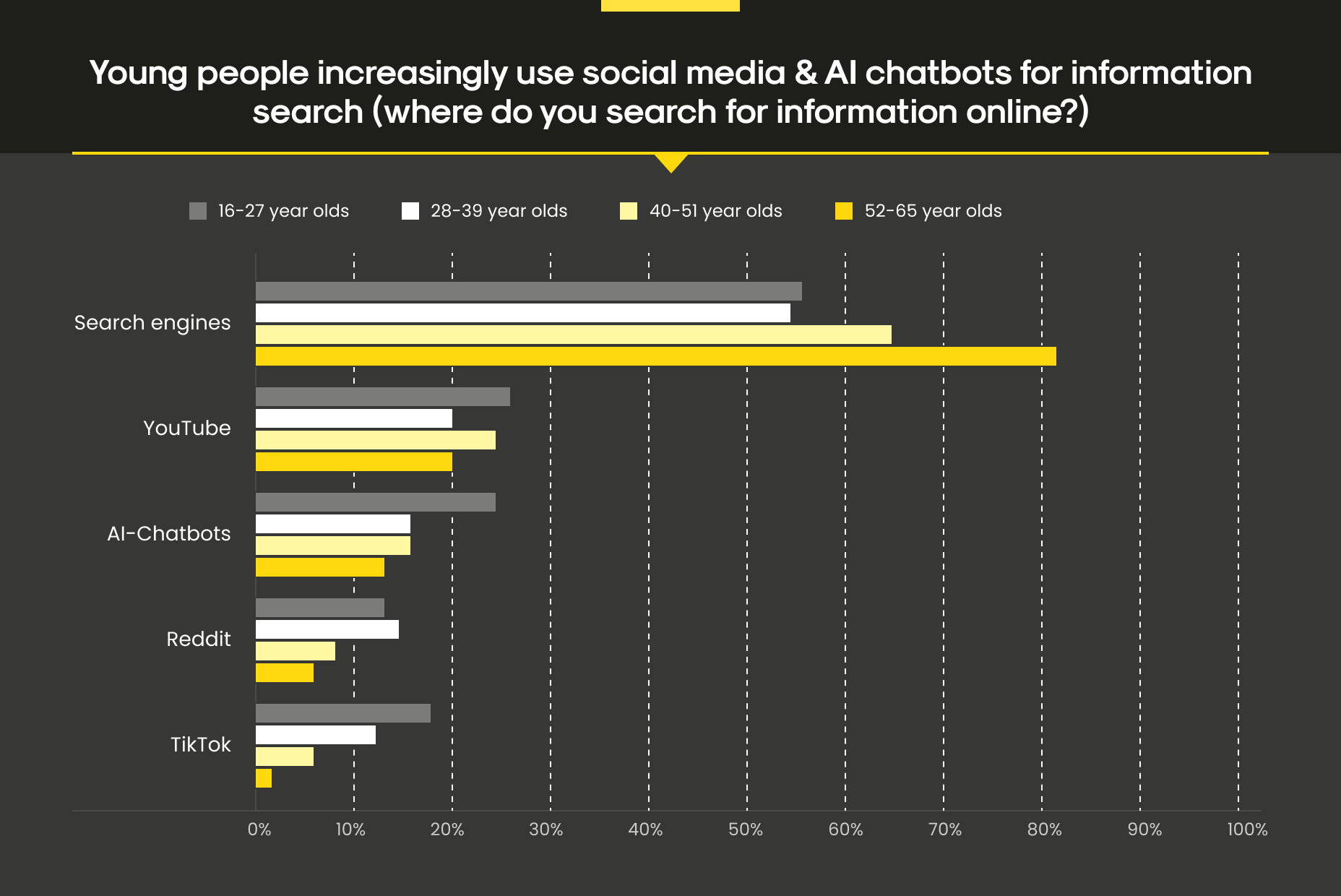For over two decades, “Google it” has been shorthand for finding anything online. From homework questions to holiday planning, search engines became the default gateway to knowledge. But if you ask Gen Z (the first generation to grow up with both social media feeds and AI assistants) Googling isn’t always the reflex. Many of them search TikTok before they search Google, ask ChatGPT before they type keywords, and use Discord servers as knowledge hubs instead of static web pages.
So, the burning question: will Gen Z even Google ten years from now? The answer is complicated, but one thing is clear: large language models (LLMs) like GPT, Claude, and Gemini are already reshaping how information is found, filtered, and trusted.

Social media and AI chatbots search stats
In fact, this shift is about how digital natives interact with information in a world drowning in data. Let’s unpack what’s happening, where LLM-driven search fits in, and the top ways this generation (and increasingly everyone else) is searching with AI.
In this article, you’ll learn:
- Why Gen Z no longer defaults to Google, and how their search habits differ from previous generations
- How LLM-driven search changes the game with conversational, contextual, and personalized answers
- The top ways people now search with AI, from chat-style queries to multi-modal inputs and agent-powered exploration
- The challenges of LLM search, including hallucinations, bias, and the trust gap
- What the rise of AI-first search means for businesses, SEO, and brand visibility
- How knowledge workers will shift from information gathering to validating AI’s synthesized insights
- Why the future of search will be layered:Google plus AI assistants, not one replacing the other
- And how Mitrix can help you build conversational AI systems, intelligent bots, and workflow-integrated assistants
Why Google isn’t the default anymore
Sarcastic as it sounds, Gen Z didn’t grow up marveling at Google’s clean white page. They grew up in feeds, threads, and endless recommendation loops. Their “search” habits reflect that environment:
- Discover-first mindset. TikTok and Instagram suggest information before you even look for it. By the time a Google search might happen, context has already been shaped.
- Keyword fatigue. Typing clunky phrases like “best affordable wireless earbuds under $100 review” feels outdated compared to asking an LLM, “What’s the best budget-friendly wireless earbud right now, and why?”
- Trust in people-like voices. Gen Z often trusts content that “sounds human,” whether it comes from influencers or conversational AI. They don’t want 2 million links, they want one solid answer.
That said, it doesn’t mean Google is dead. But it does mean traditional search is becoming one of many ways to navigate information, not the only way.
Enter the AI-native search era
As of today, large language models are rewriting the playbook. Instead of links, ads, and endless scrolling, AI search offers direct, contextual answers. Instead of static ranking algorithms, it adapts to the nuance of your phrasing. And instead of one-size-fits-all results, it moves toward personalization.
What makes LLMs appealing as search tools?
- Conversational queries. You ask in natural language, not keywords.
- Contextual memory. They remember what you asked five steps earlier and refine answers as the conversation continues.
- Synthesis, not just retrieval. Instead of listing ten articles, they summarize the core points.
- Multi-modal capabilities. Search isn’t just text: you can add images, voice, or even diagrams.
For Gen Z, this feels more aligned with their digital fluency: fluid, adaptive, and conversational.
Top ways Gen Z (and everyone else) uses LLMs to search
Without further ado, let’s break down the most common (and increasingly dominant) ways LLMs are transforming search behavior.
1. Chat-style queries
The simplest but most powerful change: you can talk to AI like a friend. Instead of parsing SEO-optimized results, you get a distilled, human-like explanation.
Example. Instead of Googling “what is inflation simple explanation” and clicking through Investopedia or Wikipedia, you can ask an LLM, “Explain inflation like I’m 15, with an example.”
But why does it matter? One word – accessibility. Basically anyone can search without mastering keywords.
2. Context-rich answers
LLMs don’t just spit facts, but shape responses based on your intent. If you’re planning a trip, the AI can factor in preferences like budget, weather, and activities – without you opening ten different tabs.
Example. “Plan me a three-day Tokyo trip focused on anime, tech, and cheap eats.”
Why it matters: Search becomes planning, not just information retrieval.
3. Personalized discovery
LLMs can tune answers to your history and style – something Google technically does but in a more opaque way. With fine-tuning, embeddings, or local AI assistants, you can build an “AI that knows you.”
Example. A student’s AI tutor that remembers weak spots in algebra and suggests practice questions accordingly.
Why it matters: Knowledge becomes individualized, not just generalized.
4. Multi-modal queries
Forget just text. LLM-powered systems handle screenshots, charts, PDFs, or even voice input. This makes information search less about typing and more about interacting.
Example. Uploading a confusing tax form and asking, “What line am I supposed to fill here, and why?”
Why it matters: barriers drop. You don’t have to translate your problem into keywords as the AI interprets raw context.
5. Workflow-integrated search
Why leave your workspace? LLMs now live inside Slack, Notion, Teams, or even your email. You can “search” without opening Google at all.
Example. Asking your project bot, “Summarize what the client requested in last week’s Slack thread and compare it to the scope doc.”
Why it matters: Contextual efficiency. Information is searched exactly where you need it.
6. Agent-powered exploration
The cutting edge of LLM search isn’t just one-off answers, it’s autonomous agents that keep digging, cross-referencing, and reporting back.
Example. Asking an AI agent, “Track the top 5 competitors’ new product launches this quarter and alert me if pricing changes.”
Why it matters: Search becomes proactive. Instead of looking once, AI continuously scouts information for you.
The challenges of LLM search
This all sounds futuristic and exciting, but let’s not pretend it’s perfect. AI-powered search has real limitations:
- Hallucinations. AI can generate confident nonsense. You may get fluent but false answers.
- Bias. LLMs reflect biases in their training data, which can warp results.
- Lack of transparency. Unlike Google’s source links, LLM answers often obscure where information comes from.
- Trust gap. Users may trust conversational AI too much, assuming it’s authoritative.
For Gen Z (somewhat skeptical of traditional institutions) this creates a paradox: they distrust corporations but risk trusting AI too quickly.
What this means for businesses and knowledge workers
This way, if your business depends on being “found” through Google search rankings, the rise of LLM-driven search is a wake-up call. SEO alone won’t cut it when users bypass links altogether and ask AI directly.
- Content strategy must adapt. Companies need to structure information so LLMs can retrieve and synthesize it. Clear, high-quality, well-labeled data is key.
- Brand presence shifts. Instead of page-one rankings, visibility might mean being cited in AI outputs or building your own branded assistant.
- Customer support redefines itself. Many Gen Z users will talk to a bot before they talk to a human. Businesses need conversational AI ready to answer naturally.
- Decision-making changes. Knowledge workers will spend less time gathering data and more time validating AI’s summaries. Critical thinking, not just searching, becomes the key skill.
Key takeaways
- Google isn’t the only gatekeeper anymore. LLM-driven search bypasses links, changing how businesses get discovered.
- SEO evolves into data clarity. Structured, well-labeled, high-quality content is what LLMs can retrieve and reuse.
- Visibility means new formats. Brands must aim to appear in AI outputs or create their own assistants.
- Customer support goes conversational. Gen Z often prefers bots first, so companies need natural, reliable AI support.
- Critical thinking becomes the edge. Workers shift from gathering information to validating AI’s summaries.
Future outlook: from searching to conversing
So, will Gen Z even Google? The short answer: yes, but not always, and not in the same way. Google will remain a powerful infrastructure layer, but the interface of search is shifting. For younger users, “search” isn’t about typing keywords into a box. It’s about conversation, assistance, and discovery across multiple modalities.
We’re heading toward a world where:
- Search looks more like chatting with a tutor than scanning links.
- Information finds you before you ask for it.
- AI agents continuously monitor, filter, and deliver insights.
- Trust shifts from institutions to systems that feel personal, even if they’re synthetic.
That’s not the end of the search. It’s the end of the search as we knew it.
Key takeaways
The way people search for information is undergoing its biggest transformation since the dawn of Google. For Gen Z, typing keywords into a search bar is no longer the default move. Instead, they turn to TikTok, Discord, Reddit, and increasingly, AI chatbots that deliver answers in a conversational flow. Large language models (LLMs) amplify this trend, replacing static lists of links with context-driven, personalized responses. Understanding these shifts is essential for anyone trying to stay visible in a world where “Googling it” is no longer a guarantee.
- Gen Z doesn’t default to Google: TikTok, AI chatbots, and community platforms increasingly fill that role.
- LLMs change search by offering conversational, contextual, and personalized answers instead of raw lists of links.
- Top LLM-driven methods include chat-style queries, multi-modal inputs, workflow integration, and agent-powered exploration.
- Businesses must rethink SEO, knowledge distribution, and customer engagement strategies to stay visible in an AI-first search landscape.
- The future of search is less about typing and more about conversing with AI shaping how we find and trust information.
The future of search won’t be a battle between Google and LLMs: it will be a layered landscape where conversation, personalization, and trust define visibility. Gen Z is already living in this new paradigm, and the rest of us are catching up. For businesses, educators, and creators, the challenge is clear: adapt to an AI-first search world or risk being invisible. Those who learn how to engage audiences across conversational AI, community platforms, and multimodal channels will define the next era of discovery.
How Mitrix can help
At Mitrix, we deliver AI/ML and generative AI development services that help companies:
- Design intelligent bots that understand supply chain workflows
- Integrate chatbots with tracking systems, CRMs, ERPs, and TMSs
- Build multilingual, multi-channel support agents (WhatsApp, web, SMS)
- Monitor performance and apply machine learning for ongoing improvements
We help companies turn AI hype into practical outcomes:
- Build AI agents tailored to your workflows
- Integrate systems seamlessly across CRM, ERP, and support platforms
- Monitor performance and continuously improve AI outputs
- Ensure compliance, ethical standards, and reliable operation
Whether you’re coordinating international freight, managing warehouse logistics, or optimizing last-mile delivery, Mitrix can help build the chatbot system to match. Contact us today to discuss your needs!
Summing up
All in all, Gen Z’s shifting search habits aren’t just a cultural quirk: they’re a signal of where all digital interactions are heading. For this generation, information doesn’t live on static web pages buried under ads and blue links. Instead, it flows through conversations, feeds, and AI assistants that respond instantly to context. Large language models accelerate that shift, turning search from a task into an experience of dialogue, discovery, and personalization.
But that doesn’t mean the old world disappears, so to speak. Google and traditional engines still matter for fact-checking, sourcing, and depth. What’s changing is the front door. Instead of starting every question with a keyword, people increasingly start with a prompt. The winners will be those who adapt to this blended reality quicker: maintaining authority and transparency while embracing AI-powered discovery. In the long run, the future of search won’t be “Google versus LLMs,” but rather a layered ecosystem where conversational AI becomes the default interface to the world’s information.


